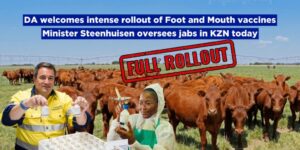Note to editors: Please find attached soundbite by Noko Masipa MP
On 15 February 2023, Statistics South Africa (StatsSA) released the consumer food price inflation (CPI) figures that show the price of stable food such as bread and cereals, meat, fish, fruit, and vegetables increased notably and become unaffordable for South Africans.
These price increases are primarily the results of loadshedding. The ANC government does not seem to have a plan to stop agriculture from being adversely affected. Despite several calls by the DA for a specifically targeted plan to reduce the negative effects of load shedding, there is still no plan from the Department of Agriculture, Land Reform and Rural Development (DALARRD) Minister Thoko Didiza and Eskom management.
In the last twelve months, Russia’s invasion of Ukraine has also played a role in food price increases; and this has resulted in prices of fertilizers shooting through the roof. All these have placed South Africa on the verge of doubling the challenges of the inability to produce food affordably and purchase of available food due to rising unemployment. This will ultimately result in a triple burden of malnutrition which includes undernourishment, micronutrient deficiencies and obesity.
All these challenges are going to make it even more difficult for DALRRD to implement the highly touted Agriculture and Agro-processing Master Plan because the government will now need to solve the new crisis at its door steps.
While the ANC government does not have control over the Russian war on Ukraine, Eskom as an SOE and its blackout schedules is unfortunately under government control. The DA therefore calls on Eskom and DALRRD to provide agriculture with a specific loadshedding schedule that accommodates its production to reduce diesel costs.
The DA continues to plead with the government to put measures in place that will protect the food production systems in the country to alleviate hunger and poverty. In doing so, both emerging and commercial farmers impacted by rising costs of production shall be protected.




